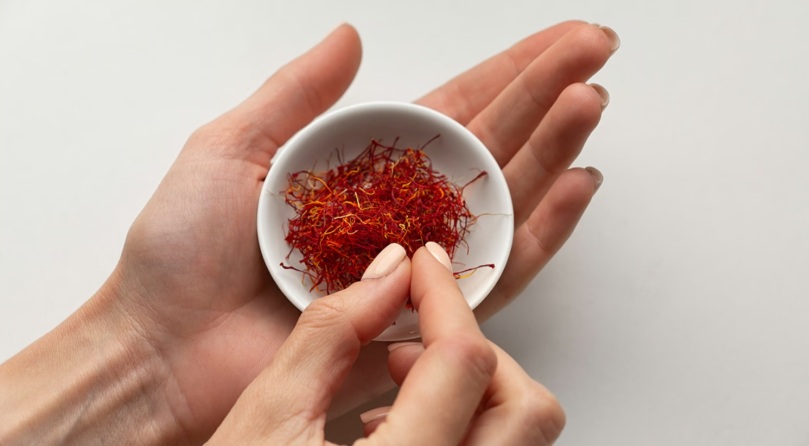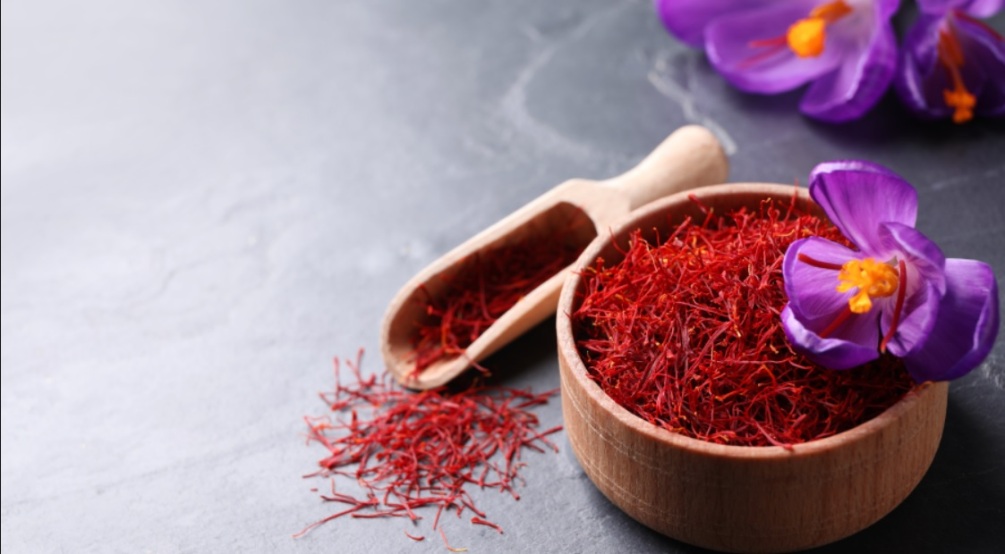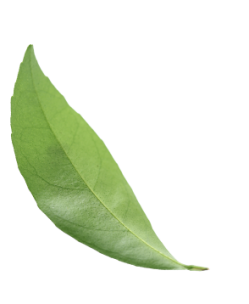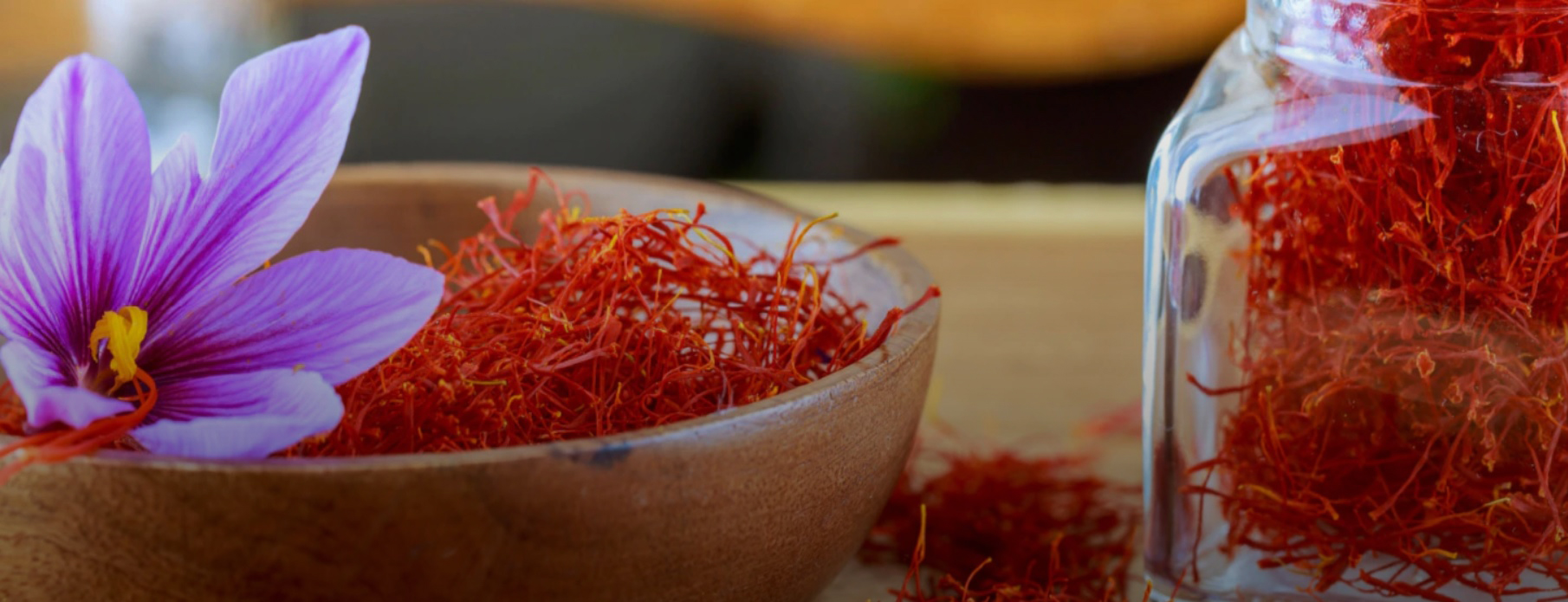Benefits of Saffron
What do the compounds in saffron do to our body?

Saffron is a brightly-colored spice that’s high in health-promoting compounds, such as carotenoid antioxidants. Research findings suggest saffron has anti-inflammatory and antioxidant effects and may improve heart health, reduce symptoms of depression and anxiety, improve sleep, and protect eye health.
Contains Powerful Anti-Inflammatory and Antioxidant Compounds
Saffron is rich in anti-inflammatory and antioxidant substances, including carotenoids like crocin, crocetin, and picrocrocin, and terpenes like safranal, which are the main bioactive compounds found in saffron.
Crocitin, crocin, picrocrocin, and safranal have been shown to have powerful antioxidant and anti-inflammatory activities. Study findings suggest that regularly consuming saffron and taking saffron supplements may help reduce inflammation and lower markers of oxidative stress. Oxidative stress is a condition that occurs when there’s an imbalance between the production of reactive oxygen species (ROS) and antioxidant defenses in the body, which can lead to cellular damage.
A study that included 80 people with type 2 diabetes found that participants who supplemented with 100 milligrams of saffron per day for 12 weeks had significant reductions in blood levels of malondialdehyde (MDA), a marker of oxidative stress, compared to a control group.
Crocin and other protective compounds found in saffron may help prevent the production of ROS, reduce cellular damage, and increase levels of antioxidant enzymes. All of these factors can help protect against chronic disease development and improve overall health.

May Improve Sleep
Research suggests the active substances found in saffron have sleep-inducing properties and may have a beneficial effect on sleep quality and duration.
A recent review that included five studies and 379 participants found that treatments containing saffron or its active substances, including crocin, helped improve sleep quality and sleep duration.
The researchers suggested that saffron may help improve sleep by increasing levels of the sleep-regulating hormone melatonin and acting on certain receptors in the brain to enhance sleep quality.
While these results are promising, research is limited, and more studies on the effects of saffron on sleep are needed.
Saffron has shown promise as a natural treatment for mental health disorders, including anxiety and depression.
A review of 23 studies found that, compared to placebo treatments, saffron treatments had a significant positive effect on symptoms of depression and anxiety. The review also noted that saffron had similar effects on depressive symptoms as antidepressant medications.
Researchers think certain substances in saffron, such as crocin and safranal, improve symptoms of anxiety and depression by inhibiting the reuptake of mood-boosting neurotransmitters like dopamine, norepinephrine, and serotonin. This would increase levels of these feel-good chemicals in the brain.
Although saffron shows promise as a natural treatment for some mental health disorders, more research in this area is needed. If you’re interested in trying saffron for a mental health disorder, it’s important to check with your healthcare provider first to ensure it’s a safe and appropriate option for your specific needs and diagnosis.
May Benefit Mental Health
May Benefit Certain Eye Conditions
Some studies suggest saffron may benefit people with conditions that impact the eyes, such as age-related macular degeneration (AMD), an eye disease that’s currently the leading cause of vision loss in older adults.
Supplementing with saffron has been shown to improve vision in people with AMD and people with diabetic maculopathy, a complication related to diabetes. Saffron supplements have also been shown to reduce eye pressure in people with glaucoma, a condition characterized by increased pressure in the eye, which damages the optic nerve and causes vision loss.
Since most eye diseases are caused by increased inflammation, the anti-inflammatory and antioxidant compounds found in saffron could help reduce inflammation in the eye. This could improve eye disease-related symptoms and protect against the progression of eye conditions.
Could Boost Heart Health
Due to saffron's anti-inflammatory and antioxidant effects, adding the spice to your diet could help improve cardiovascular health.
Saffron interventions have been shown to be effective in reducing certain heart disease risk factors, such as high levels of blood pressure, blood sugar, and cholesterol.
A review of 19 studies found that saffron treatments significantly reduced fasting blood sugar and diastolic blood pressure, as well as levels of total cholesterol and LDL cholesterol, compared to control treatments.
Risks of Saffron
When consumed in normal amounts, such as when using saffron as a spice in cooking, saffron is generally considered safe.
Taking saffron supplements is also considered safe, but when taken in higher doses, saffron can lead to minor side effects such as dizziness, fatigue, dry mouth, anxiety, nausea, and headache in some people.
Studies report that supplementing with up to 100 mg of saffron extract daily for up to 26 weeks is safe and not associated with significant side effects. However, taking saffron supplements for longer than 26 weeks or consuming more than five grams of saffron per day could lead to serious side effects, such as bloody diarrhea and vomiting. Ingesting more than 12 grams of saffron per day can be lethal.
There’s not enough evidence to support the safety of ingesting high levels of saffron in pregnancy. People who are pregnant or breastfeeding should avoid ingesting high doses of saffron, such as saffron supplements.





















